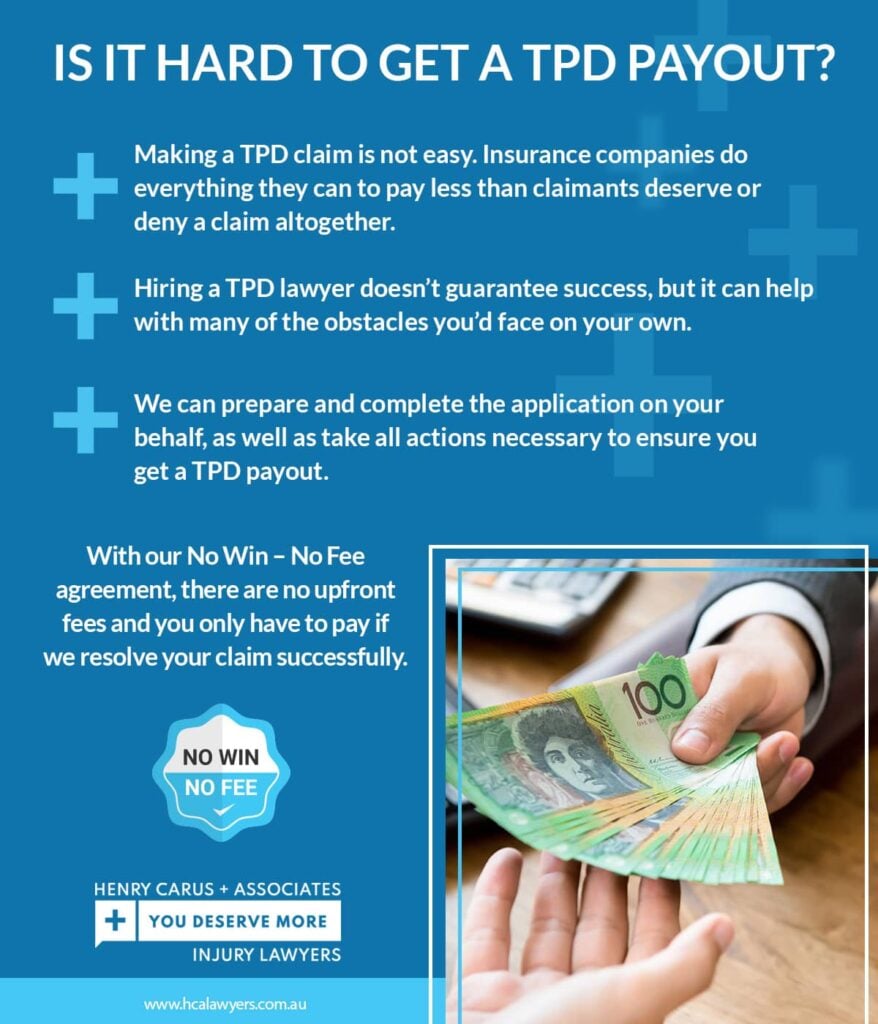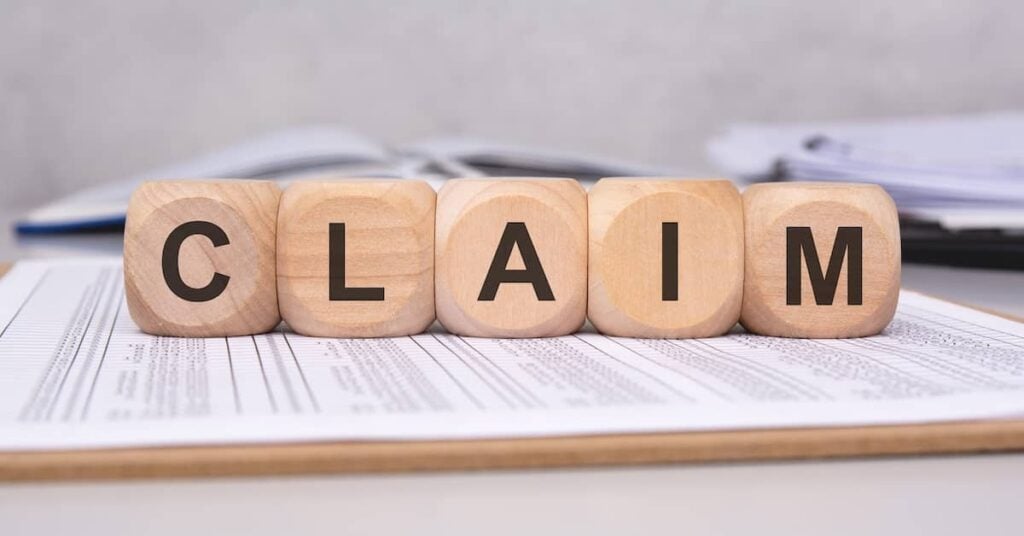In 2005, Lee was involved in a tragic accident, which wasn’t his fault. After years of delays, the TAC offered him $750,000 – then, we helped him to get a new offer of $1.1 million just two week later. That’s an extra $350,000 in two weeks!
TPD lawyers at Henry Carus + Associates can help you lodge a total and permanent disability (TPD) claim. Our expertise in complex insurance matters helps us obtain payouts for clients who are unable to work due to an injury or illness.
Making a TPD claim is not easy. Insurance companies do everything they can to pay less than claimants deserve or deny a claim altogether. Our lawyers specialise in a wide range of insurance claims, identifying all available options for replacing lost income and securing your financial future.
A lump sum TPD payout can provide disabled individuals with life-changing money when they need it most. Speak to knowledgeable TPD lawyers who can assess your eligibility and help you achieve a favourable outcome. Call Henry Carus + Associates at 03 9001 1318 today for a FREE, no-obligation consultation. We serve clients in Melbourne and all of Victoria.
No Win – No Fee TPD Lawyers
Henry Carus + Associates handle ALL claims on a No Win – No Fee basis. This means we require no upfront payment, and clients only pay if and when we are successful with the matter on their behalf.
Some firms still charge clients for out-of-pocket expenses when a matter is unsuccessful, but that’s not how we operate. If you get a TPD payment due to our efforts, you pay disbursements and an uplift fee. You pay us nothing until then, and nothing in the event that your claim doesn’t succeed. There is absolutely no financial risk for you.
Read more about our No Win – No Fee agreements.
What Is a TPD Claim?
A TPD claim is a benefit request made through total and permanent disability (TPD) insurance. TPD insurance is often included in superannuation cover, although some policies may be purchased separately.
Our lawyers bring unrivalled expertise to superannuation claims, including TPD insurance. We can assist you with all aspects of the application process and fight to secure a payout that you deserve.

What Are the Conditions for a TPD Claim?
You may be entitled to TPD compensation if you can no longer work due to an injury, a chronic medical condition, or mental illness. Usually, the disability must completely prevent you from working for a minimum of 3 months before you can apply for TPD; this is known as the waiting period.
These criteria may seem pretty simple and easy to meet. Unfortunately, many disabled people struggle to get TPD payouts. It is vital to seek legal advice as soon as possible if you are thinking about making a TPD claim or your claim has been rejected.
Can I File a TPD Claim?
First, we need to verify your total and permanent disability insurance. Henry Carus + Associates can review your insurance cover and make sure any and all policies are valid. We perform this evaluation as a FREE SERVICE to you.
Next comes the process of determining whether you qualify for TPD. Every situation is different, but TPD insurance typically pays if a claimant is totally disqualified from employment due to:
- Physical injuries such as a traumatic brain injury, spinal injury, burns, etc.
- Mental health conditions like PTSD, depression, anxiety, etc.
- Heart attacks, strokes, and other sudden medical events
- Cancer, arthritis, multiple sclerosis, and other chronic conditions
- Terminal illnesses
We help clients explore all options for compensation after an injury. In addition to no-fault benefits and/or common law compensation, you may be able to file for TPD after a road accident, workplace accident, slip-and-fall, or other incident resulting in total and permanent disability.

Should I Get a Lawyer for a TPD Claim?
Yes, the importance of retaining a lawyer for TPD claims cannot be stressed enough. In addition to determining whether you are entitled to TPD compensation, a specialist lawyer can assist you with all aspects of the claims process (which is typically tedious and overwhelming).
Having a trusted advocate is critical for success in most legal matters, and applying for TPD is no exception. TPD insurance has the lowest rate of acceptance amongst all life insurance products. Claimants often find themselves in an uphill battle to get the benefit they deserve.
Our TPD lawyers can help you prepare a complete application with compelling medical evidence. This does not guarantee acceptance of your claim right away, but it lays the groundwork for a successful payout. If your claim is denied, our knowledge of how insurance companies operate—and strong negotiating skills—are advantageous for resolving disputes.
Contact Henry Carus + Associates for FREE today.
How Do TPD Claims Work?
The exact steps involved in lodging a TPD claim may vary from one insurer to another. One of the first things our lawyers do is fully review your insurance policy so we have a comprehensive understanding of the terms and conditions. This will help us determine if you meet the insurer’s eligibility criteria for total and permanent disability, as well as what’s involved in applying.
1. Completing the Application
Your application must include strong supporting evidence of your disability. TPD insurers generally require a minimum of two statements from medical practitioners involved in your treatment. These statements must summarise your disability and state how your condition totally and permanently prevents you from working.
A skilled TPD lawyer will obtain your medical records, treatment notes, lab reports, imaging, and other evidence to support your claim. Your lawyer may also recommend undergoing additional medical assessments.
Before submitting the application to the insurer, we will collect any other required information. This may include proof of identity, documentation of your employment history, income and earnings statements, etc.
2. Awaiting the Decision
Once the application is submitted, there is little more to do than wait. This can be a stressful time, but Henry Carus + Associates are here to offer the support and guidance you need. We are also on standby should the insurance company request additional information or assessments.
TPD claims generally take 6 months to finalise. More complicated claims could take a year or more.
3a. Your Claim Is Approved
Once the insurer reaches a decision, there are two possible paths. The first (and best) is approval of your claim.
You will receive notice that your claim has been approved and the amount your insurer is prepared to pay. Our lawyers can discuss whether the payout offer seems fair. If you decide to accept, the money will be deposited into your superannuation account (or, for claims outside of super, you will receive the TPD payout directly).
3b. The Claim Is Denied
There are multiple reasons a TPD claim may be denied:
- Inactive or cancelled TPD insurance.
- The insurer doesn’t believe you meet the definition of ‘total and permanent disability’.
- Insufficient evidence of disability.
- Lodging a claim before the waiting period is over.
- Inadequate work history.
No matter the reason cited for denial, the rejection of a TPD claim may seem like the end of the line. In reality, you still have options which a capable TPD lawyer can help you pursue.
The first option is to provide additional information and ask the insurer to reconsider the application. If consideration of your claim was attended by issues like poor communication, needless delays, and other issues, you can lodge a formal complaint with the insurance company and/or the Australian Financial Complaints Authority.
Finally, you may be able to take the matter to court. Henry Carus + Associates have the knowledge and experience essential for navigating litigation and courtroom proceedings.
Is It Hard to Get a TPD Payout?
Yes, it can be extremely difficult to obtain a TPD payout. Insurance companies aren’t known for making things easy for claimants. Most people will find it very difficult to complete the application themselves. Even if they get through it all and apply, many people who lodge their own claims have them rejected.
Hiring a TPD lawyer doesn’t guarantee success, but it can help with many of the obstacles you’d face on your own. We can prepare and complete the application on your behalf, as well as take all actions necessary to ensure you get a TPD payout. With our No Win – No Fee agreement, there are no upfront fees and you only have to pay if we resolve your claim successfully.

How Much Is a TPD Claim Worth?
The value of a TPD claim depends on a number of different factors. Your age at the time of disability, the type of TPD insurance you have, and the terms of your policy may all have a bearing on your entitlement.
Another important consideration is how many TPD policies you have. Some people have cover through multiple policies, usually through switching jobs. You may have more than one entitlement if you meet the criteria for total and permanent disability under different insurances.
Henry Carus + Associates are committed to getting you maximum compensation. We can review the money in your super and the cover available through other policies to provide you with an accurate assessment of how much your TPD claim(s) may be worth.
What Are the Time Limits for TPD Claims?
During the waiting period, which can last anywhere from 3–6 months, you cannot lodge a claim for TPD compensation. Once you’ve cleared the waiting period, you should file a claim as soon as possible. This isn’t due to a particular time limit (most insurers let you apply so long as the policy is valid), but because you don’t want to wait to receive the financial assistance you need.
Insurers do impose strict time limits for appealing adverse decisions. Contact our TPD claims lawyers right away if you receive a rejection, and we will take the appropriate steps without delay.
Frequently Asked Questions About TPD Claims
Approximately 83% of TPD claims are successful. Statistics from the Australian Prudential Regulation Authority show that acceptance rates saw a recent decline after several years of improvements.
How total and permanent disability is defined, the complexity of the claim, and the quality of the application can all have an effect on the success of a claim. The involvement of a TPD lawyer can also make an enormous difference.
On average, TPD insurers approve claims within approximately 7 months. How long it takes depends, in part, on the insurer processing the claim. TAL Insurance has the fastest acceptance rate (just over 6 months), while ClearView has the slowest (just under 1 year).
You may be entitled to TPD compensation for numerous injuries and illnesses. If you are sick or hurt and can’t work—and it looks like you won’t ever be able to go back to work—you may have a claim for TPD.
A TPD lawyer can help you lodge a claim for the following conditions:
- Spinal cord injuries resulting in paralysis (paraplegia, quadriplegia/tetraplegia)
- Amputations (loss of limbs such as hands, feet, etc.)
- Severe brain injury (traumatic brain injury or acquired brain injury)
- Stroke (with lasting cognitive or physical impairment)
- Heart attack (if it results in permanent disability)
- Severe musculoskeletal disorders (e.g., degenerative disc disease, severe back injury, failed surgeries, etc.)
- Chronic pain conditions (e.g., fibromyalgia, complex regional pain syndrome, etc. (if permanently disabling))
- Cancer (especially advanced stages that prevent return to work)
- Organ failure (lung, liver, kidney, etc.)
- Respiratory diseases (like severe chronic obstructive pulmonary disorder, asthma, silicosis, etc.)
- Motor neurone disease
- Multiple sclerosis (MS)
- Parkinson’s disease
- Severe arthritis (crippling form, particularly rheumatoid arthritis)
- Severe burns (covering large body areas or affecting mobility)
- Loss of sight, hearing, or speech (total and irreversible)
- Major depressive disorder (severe, treatment-resistant, and permanent)
- Post-traumatic stress disorder (PTSD – severe and chronic)
- Schizophrenia
- Bipolar disorder (severe and poorly controlled)
- Anxiety disorders (only if extremely severe and permanent)
- Early-onset dementia (Alzheimer’s, vascular dementia, etc.)
- Epilepsy (uncontrolled and severely disabling)
- Chronic kidney disease (stage 5/end-stage renal disease if work-precluding)
- Severe diabetes complications (amputations, blindness, kidney failure)
- Autoimmune diseases (severe cases of lupus, scleroderma, etc.)
- Severe gastrointestinal disorders (e.g., Crohn’s disease, ulcerative colitis, etc. if major complications)
TPD insurers will look at multiple factors to determine whether you have a valid claim, including your previous occupation(s), education, training, etc. For TPD claims through superannuation, you will need to show how your condition disqualifies you from work in any occupation for which you would otherwise be suited.
For most disabled people, a return to work is not in the cards. Serious illnesses and injuries are often difficult or even impossible to overcome. That said, advances in therapy and support technologies, along with flexible workplace arrangements, may permit a return to work in some cases. Unfortunately, returning to work shortly after a TPD claim is settled can raise alarm bells for the insurer. TPD insurers have gone after claimants for fraud if they suddenly go back to work after getting a payout.
Returning to work is a decision between you and your doctors. You should seek legal advice if you are concerned about the legal ramifications of working after you receive a TPD entitlement.
Contact TPD Lawyers in Melbourne Today
TPD insurance can be a lifeline for disabled people. Sadly, insurance companies make it difficult for applicants to obtain this benefit. At Henry Carus + Associates, we treat every client as a person with unique needs. We customise our legal services based on your circumstances.
There may be multiple forms of compensation available for a serious injury or illness. Some fall under one of Victoria’s compensation schemes (such as TAC or WorkCover), others are common law matters, and others still are governed by insurance. Our TPD lawyers have unique expertise in each of these claims, enabling us to obtain maximum compensation for clients. It’s all part of our philosophy of You Deserve More.
Henry Carus + Associates Can Help with Your TPD Claim
Our TPD lawyers serve clients from all over Victoria. For a FREE, no-obligation consultation, call us at 03 9001 1318 today. Henry Carus + Associates have offices in Melbourne and communities throughout the metro region.
 Call Us Today
Call Us Today



